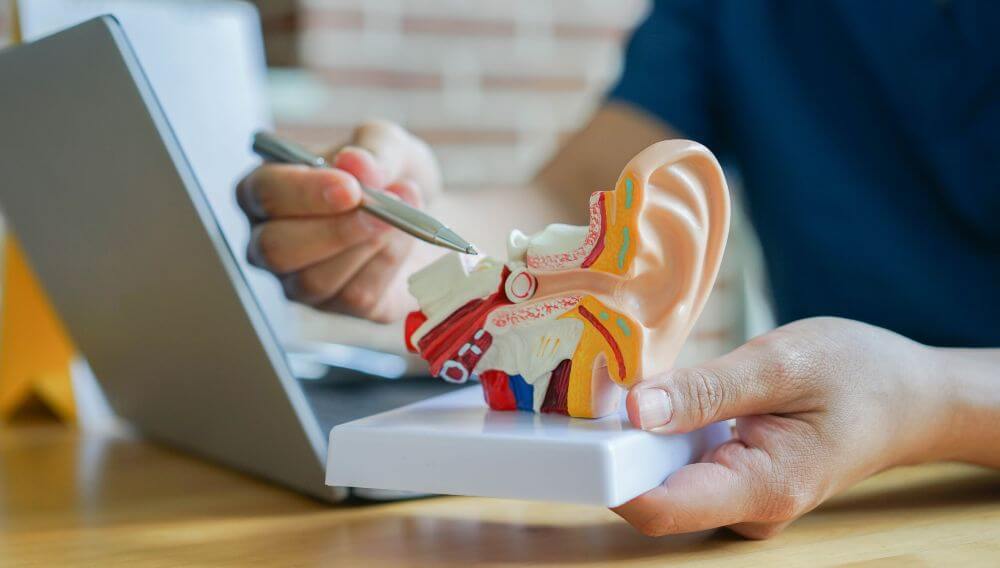Hearing loss impacts people of all ages. Often it is permanent and worsens over time, especially if ignored. Fortunately, there are a lot of options, starting with professionals who are trained to identify and treat hearing loss.
Should you have concerns about your hearing or that of someone in your life, an audiologist or hearing care provider can perform an audiological examination. This involves measuring the softest level at which each ear can perceive sound with tones as well as speech sounds. Upon completion of the exam, the audiologist or hearing care provider will determine the most optimal solution for you or your loved one.
What Causes Hearing Loss?
People of all ages can have trouble processing sound. While hearing generally worsens with age, and is more prominent after age 50, even children sometimes have diminished hearing.
The most common causes of hearing loss: the aging process, unsafe listening practices or exposure to extremely loud noises, all can lead to life-long issues.
A Gradual Change
Presbycusis, or hearing loss caused by aging, can be difficult to recognize in oneself, since it often occurs very gradually. Approximately one in three people between the ages of 65 and 74 experiences treatable hearing loss according to the National Institute on Deafness and Other Communication Disorders (NIDCD). Despite this, many families report that their aging loved ones are in denial that their hearing has deteriorated.
Hearing Loss in the Outer or Middle Ear
Conductive hearing loss is another type of hearing loss often caused by an obstruction in the outer or middle ear, preventing sound from making its way to the inner ear. Unlike presbycusis, conductive hearing loss often only happens in one ear. Fluid buildup or excessive earwax can cause conductive hearing loss. Sometimes having an audiologist or medical professional clean up the ear canal can restore hearing. If the hearing loss requires medical attention, your hearing care provider will refer you to a medical professional such as your primary care physician or an Ear Nose and Throat (ENT) physician.
A Billion Young People at Risk of Hearing Loss!
Even in younger people, exposure to loud noise can trigger hearing loss. Globally, the World Health Organization estimates (WHO) estimates that over one billion young adults are at risk of permanent, avoidable hearing loss due to unsafe listening practices. With exposure to atypically loud environments such as concerts, loud music in a car with windows open, and sporting events, there is an increased risk of causing irreparable damage over time. Ironically, fitness classes with loud music can even pose a risk.
Hearing Loss, Dementia, and Other Associated Conditions
Of course, hearing loss causes trouble with communication, but it can also pose serious health problems. Social isolation, tinnitus (‘ringing in the ear’ or hearing loud sounds which have no explanation), and dementia are all linked to hearing loss. Research from Johns Hopkins revealed that hearing loss is linked with walking problems, falls, and even cognitive decline. A more recent study states that 8% of dementia is caused by untreated loss.
Some people may be genetically or environmentally predisposed to hearing loss, whether from chronic conditions or the development of the ear itself. Those most at risk of hearing loss include people with heart disease or diabetes, and those with frequent exposure to extreme noise, such as factory workers who operate loud machinery or construction workers. Even preschool teachers are at increased risk.
How can I Prevent Hearing Loss?
To prevent hearing loss, it is important to employ safe listening practices. WHO recommends limiting daily volume levels to at or below 85 dB for a duration of a maximum of eight hours. Audiologists also recommend wearing well-fitting ear plugs in loud environments, and limiting time spent in noisy places.
To help put this number into perspective, here are the average decibel (dBA) ratings of familiar sounds, as compiled by NIDCD:
- Normal conversation: 60-70 dBA
- Movie theaters: 74-104 dBA
- Sporting events, and concerts: 94-110 dBA
- Sirens: 110-129 dBA
Early Intervention Helps Address Hearing Loss
While it’s important to understand the signs of hearing loss and prevent damage to your hearing, the best way to know if you have hearing loss is to have your hearing tested by an audiologist or hearing care professional. Even if you are not currently experiencing difficulty hearing, checkups should take place every one to five years (depending on your age, and to monitor changes in your hearing).
As with many medical conditions, the key to treatment is early intervention. The first step to finding a solution for hearing loss is identifying the problem. NIH estimates that in the U.S. alone, approximately 29 million adults have hearing loss serious enough that they could benefit from using hearing aids. Today’s hearing aids come with a variety of styles, features and prices to fit everyone’s needs.
No matter the solution recommended by an audiologist or hearing care provider, there is no shame in getting help for hearing. Not only will you be improving your hearing, you’ll also improve your overall health and quality of life!
Next Steps to Better Hearing
Making an informed decision about your hearing starts with a conversation with an audiologist, hearing specialist or other professional. Schedule an appointment with one of our hearing care professionals today to get proactive about your hearing health.



